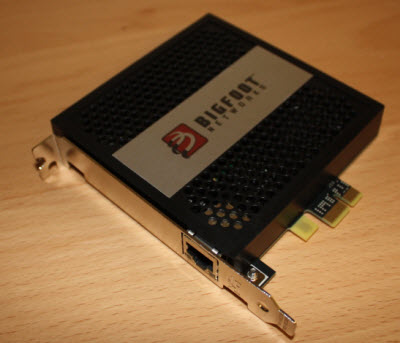 Bigfoot Networks is launching a new networking card that can give hardcore gamers an unfair advantage in online gaming duels.
Bigfoot Networks is launching a new networking card that can give hardcore gamers an unfair advantage in online gaming duels.
The new Killer 2100 gaming network card is up to 10 times faster than standard Ethernet network cards. You simply install it in your game PC and it figures out how to intelligently speed up your system.
In a typical system, 10 percent of the traffic has a delay of 30 milliseconds. That can be an eternity. The Killer 2100 gaming network card improves the latency so that the delays for the slowest traffic are less than a millisecond. In online games such as Modern Warfare 2, it can give you the drop on a rival as you both come around the corner at the same time and try to squeeze off a round before the other one shoots.
Michael Howse, chief executive of the Redwood City, Calif.-based company, said the company designed this networking card from the ground up for gigabit networks. It will help gamers, but it will also speed the performance of everyday web applications. It can, for instance, speed up the performance of streaming video over the web as well as video and audio conferences. Hence, while these products are appealing to gamers now, they will eventually be useful to just about everybody.
“We are launching the fastest network accelerator on the planet,” Howse said.
 It comes with a new software user interface that shows you exactly how fast your applications are running on the crucial measure of latency. This is a measure of how fast a data packet moves through your network into your computer for processing. It is not a measure of throughput, which is the size of your broadband connection. It’s a common misconception that bandwidth matters most in online games.
It comes with a new software user interface that shows you exactly how fast your applications are running on the crucial measure of latency. This is a measure of how fast a data packet moves through your network into your computer for processing. It is not a measure of throughput, which is the size of your broadband connection. It’s a common misconception that bandwidth matters most in online games.
For instance, you might notice a big improvement in throughput if you move from a 3-megabit per second telephone-based digital subscriber line (DSL) to a 15-megabit per second cable modem. But your game speed may not improve that much if you don’t have low latency. That’s because video comes across the web in big chunks while game traffic consists of lots of tiny little packets. Those packets usually have to wait for other data to be processed before they are passed on to the next point in the network. And that slows down the game immensely.
Bigfoot Networks attacks the latency problem with a number of tricks. For instance, it runs a version of the Linux operating system at a very low level in the system. There’s a networking chip in the card that offloads a lot of processing work that is normally done by the system’s microprocessor; this removes a big bottleneck in the system.
For game data, the card also bypasses Windows software entirely and injects the data directly into the game. It also detects what kind of game you are playing and optimizes the traffic flow to make the game run as fast as possible. That reduces stuttering, freezing, and other symptoms of lag, or slow game play, in a fast-action game. That, in turn, produces a competitive edge; you can shoot more accurately and respond more quickly when enemies threaten you.
The card software tells you in real-time which applications are consuming too much of your networking resources and slowing your game performance. You can see how fast a game is running and what percentage of your memory or microprocessor power it is using. You can block applications that are using too much of your network capacity, or throttle them back so they use less.
You can also use the company’s Gaming Network Efficiency test to figure out exactly how much faster your game speed improves using the Killer 2100. Jon Peddie, an analyst at Jon Peddie Associates, verified that the speed boost gives gamers an advantage. Howse says that you will see much faster game performance if you use the Killer 2100 network card than you might if you upgraded a graphics chip. Installation is pretty simple. You take off the computer case and install it in one of your add-in card slots.
The Killer 2100 products will go on sale today at online outlets and will be in retail stores in the coming weeks for $129. Howse says the product targets hardcore gamers, which number around 24 million.
Past generations of Bigfoot Networks’ cards are offered as built-in add-ons or as options on gaming PCs from dozens of companies, including Dell, Alienware, CyberPower and iBUYPOWER. The company was founded in 2005, and has raised $21 million in funding from North Bridge Venture Partners, Palomar Ventures and Raven Venture Partners. Rival chip makers include Broadcom, Marvell, Realtek, and Intel.
VentureBeat's mission is to be a digital town square for technical decision-makers to gain knowledge about transformative enterprise technology and transact. Learn More
